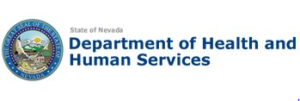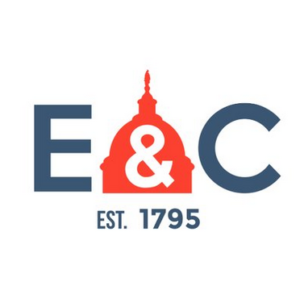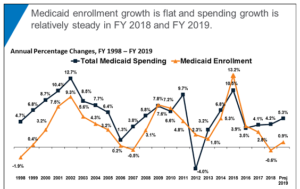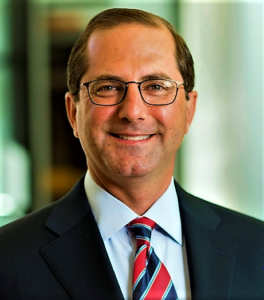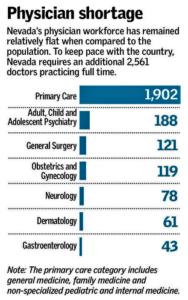- Nevada Medicaid officials confront decline in federal funds (reviewjournal.com)Las Vegas center gets probation for defrauding Medicaid (reviewjournal.com)Las Vegas health care provider sentenced for Medicaid fraud (reviewjournal.com)
State health officials gave legislators an overview of Nevada’s Medicaid program in an Assembly committee meeting...during which the program’s new administrator said the state program will be tackling a decrease in federal funding in coming years...“These rates are tied to the overall economy, so when the economy does better, we get a lower … rate from the federal government,” Suzanne Bierman, administrator...Department of Health and Human Services, said...The rate, called a federal medical assistance percentage, determines the share of Medicaid costs covered by the federal government. For the 2019 fiscal year, federal funds cover 65.09 percent of Medicaid costs...That number is expected to decrease to 64.17 percent in the next fiscal year...
- Congressional report: Drug companies, DEA, failed to stop flow of millions of opioid pills (washingtonpost.com)Committee Report Details Alleged Opioid-Dumping in West Virginia (energycommerce.house.gov)Red Flags and War ning Signs Ignored: Opioid Distribution and Enforcement Concerns in West Virginia (energycommerce.house.gov)
A report from the majority staff of the House Energy and Commerce Committee found that distributors, which fulfill orders for prescription drugs to pharmacies, failed to conduct proper oversight of their customers by not questioning suspicious activity and not properly monitoring the quantity of painkillers that were being shipped to individual pharmacies...The committee also found that the DEA did not properly use a database that aims to monitor the flow of powerful prescription painkillers from manufacturers to sellers, something that could have allowed federal agents — in real time —...The agency also curtailed enforcement of distributors...and infighting inside the agency affected the way cases were handled...
- Medicaid enrollment declines for the first time in more than a decade as strong US economy boosts income for poor Americans (cnbc.com)50-State Survey Finds Flat Medicaid Enrollment Tied to a Stronger Economy and New Eligibility Systems (kff.org)
Medicaid enrollment fell for the first time since 2007, declining by about 0.6 percent in fiscal year 2018, according to a new report from the Kaiser Family Foundation...States are budgeting for a "minimal" increase in enrollment of 0.9 percent in 2019, the report says..."States largely attribute the enrollment slowdown to a strengthening economy, resulting in fewer new low-income people qualifying for Medicaid," Kaiser says...Federal and state Medicaid spending still grew despite the drop in enrollment. Combined federal and state spending rose by 4.2 percent in fiscal 2018...The report also listed other factors that contributed to the rise in spending, including more expensive prescription drugs and states spending more money to treat substance abuse and mental health...
- FEMA releases after-action report on Las Vegas shooting (reviewjournal.com)Oct. 1 after-action report does not address confusion over UMC’s status (reviewjournal.com)FEMA 1 October After-Action Report (scribd.com)
Las Vegas police and Clark County firefighters experienced numerous communication problems and failed to follow some protocols on the night of the Oct. 1 mass shooting...But the 61-page report also described the response to the attack — which left 58 concertgoers dead and more than 800 people injured — as “efficient” and “coordinated,” crediting the counter-terrorism training of Las Vegas police...The Federal Emergency Management Agency created the report with participation from the Metropolitan Police Department and the Clark County Fire Department. It took nearly a year to complete and includes 72 lessons learned.
The after-action report...makes no mention of confusion surrounding University Medical Center’s bed availability in the immediate aftermath of the...shooting...The report, commissioned with “the intent of distributing best practices and lessons learned for other communities around the country to better prepare for a mass casualty incident,” did not address communication issues surrounding the county-run hospital’s status. Nor does it mention the county-run hospital’s improper use of an “internal disaster” alert.
- Drug Prices Are NOT Skyrocketing—They’re Barely Growing at All (drugchannels.net)
The IQVIA Institute for Human Data Science today released a new report that reveals important realities about U.S. drug pricing trends...Too many politicians and journalists remain committed to the false narrative of “skyrocketing” and “soaring” drug prices...By contrast, IQVIA data reveal that list prices for brand-name drugs grew by less than 6% in 2018. What’s more, net prices (after rebates and discounts) increased by only 1.5%. The 2018 figures mark the fourth consecutive year that net drug prices have grown by low-single-digit amounts.
- Report: Medicaid spent $677 million on health care for 240,000 full-time employees, dependents in 2017 (thenevadaindependent.com)Nevada Medicaid Recipients and Access to Employer Based Health Insurance in Nevada (dhhs.nv.gov)Department of Health of Human Services, Office of Analytics - DATA & REPORTS (dhhs.nv.gov)
FYI
- U.S. Health Chief Says Overdose Deaths Leveling Off (ktvn.com)
...health secretary Alex Azar says the number of drug overdose deaths has begun to level off after years of relentless increases driven by the opioid epidemic...Azar cautioned...it's too early to declare victory...However, he said that toward the end of last year and through the beginning of this year, the number of deaths "has begun to plateau."...provisional counts posted online by CDC show a slight leveling began toward the end of 2017.
- FDA panel backs prescribing opioid overdose reversal drug along with painkillers (reuters.com)
An advisory panel to the Food and Drug Administration....recommended prescribing the opioid overdose reversal drug, naloxone, along with addictive painkillers...The recommendation of the panel underscores concerns about the growing opioid overdose epidemic...FDA studies found that co-prescribing naloxone to all patients who are prescribed painkillers could increase annual healthcare costs by $63.9 billion to $580.8 billion...I think co-prescribing is an expensive way to saturate the population with naloxone. The at-risk population is not necessarily the ones that are being prescribed new narcotics...
- Audit: State overcharged $2.1 million by community homes for mentally ill, fraud possible (thenevadaindependent.com)
Nevada may have lost more than $2.1 million because of overbilling, fraud and overall lack of oversight of the same community homes that were found earlier this year to be providing squalid living conditions to the state’s most vulnerable residents...the state’s Division of Public and Behavioral Health likely lost up to $1.5 million in possible overpayments because of overbilling from providers of so-called community-based living arrangement homes for people with mental illnesses — and lost another $600,000 because of a discrepancy in rates paid for similar services...The financial audit...identified various questionable and potentially fraudulent billing practices by those operating the homes, including billing more hours than those recorded on time sheets, reporting serving more than one client at the same time, charging for duplicative services and paying different rates for similar services from various providers...
- Nevada again lands at bottom of national health-care ranking (reviewjournal.com)Nevada treading water despite efforts to address doctor shortage (reviewjournal.com)
Despite improvements in several areas, Nevada is once again listed at the bottom of a new national health care ranking...Nevada ranked 50th nationwide in a review of more than 100 population-level and patient-level measures published by the Agency for Healthcare Research and Quality. Only the District of Columbia scored lower overall than the Silver State...“There (are) actually areas where Nevada does fairly well — chronic disease care, diabetes, heart failure, stroke...Access to care remains a big problem. Nevada’s physician workforce hasn’t kept up with the state’s ballooning population, causing a doctor shortage...issues in accessing care, including getting an appointment with a primary care physician, having enough time in a doctor’s office and finding a specialist.

